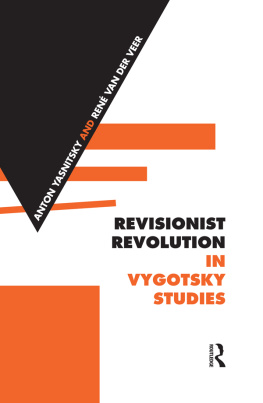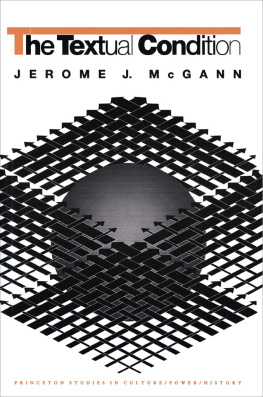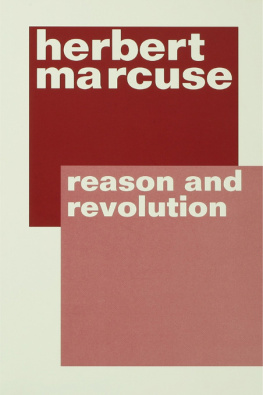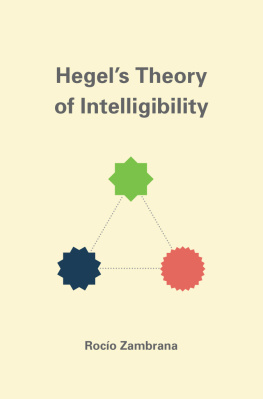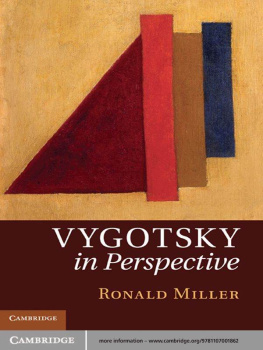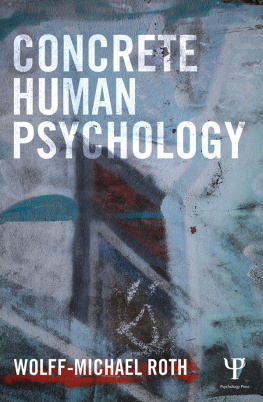First published 2016
by Routledge
27 Church Road, Hove, East Sussex BN3 2FA
and by Routledge
711 Third Avenue, New York, NY 10017
Routledge is an imprint of the Taylor & Francis Group, an informa business
2016 Anton Yasnitsky and Ren van der Veer
The right of Anton Yasnitsky and Ren van der Veer to be identified as the author of this work has been asserted by them in accordance with sections 77 and 78 of the Copyright, Designs and Patents Act 1988.
All rights reserved. No part of this book may be reprinted or reproduced or utilised in any form or by any electronic, mechanical, or other means, now known or hereafter invented, including photocopying and recording, or in any information storage or retrieval system, without permission in writing from the publishers.
Trademark notice: Product or corporate names may be trademarks or registered trademarks, and are used only for identification and explanation without intent to infringe.
British Library Cataloguing in Publication Data
A catalogue record for this book is available from the British Library
Library of Congress Cataloguing in Publication data
Yasnitsky, Anton, 1972
Revisionist revolution in Vygotsky studies / Anton Yasnitsky and Ren van der Veer.
pages cm
Includes bibliographical references and index.
1. Vygotskii, L. S. (Lev Semenovich), 18961934. 2. PsychologistsSoviet Union.
I. Veer, Ren? van der, 1952 II. Title.
BF109.V95Y37 2015
150.92dc232015003746
ISBN: 978-1-138-88730-5 (hbk)
ISBN: 978-1-138-92969-2 (pbk)
ISBN: 978-1-315-71424-0 (ebk)
Typeset in Bembo
by Out of House Publishing
Gott ist tot.
Friedrich Nietzsche
Thou shalt not make unto thee any graven image, or any likeness of any thing that is in heaven above, or that is in the earth beneath, or that is in the water under the earth. Thou shalt not bow down thyself to them, nor serve them
Exodus 20:45
Science is rooted in the will to truth. With the will to truth it stands or falls. Lower the standard even slightly and science becomes diseased at the core. Not only science, but man. The will to truth, pure and unadulterated, is among the essential conditions of his existence; if the standard is compromised he easily becomes a kind of tragic caricature of himself.
Max Wertheimer
Abbreviations
AHAP Archives of the History of American Psychology at The Drs. Nicholas and Dorothy Cummings Center for the History of Psychology, the University of Akron, OH
AJA American Jewish Archives, Cincinnati, OH
APN Akademiia pedagogicheskikh nauk [Academy of Pedagogical Sciences, Moscow]
APS American Philosophical Society, Philadelphia, PA
ARAN Arkhiv Rossiiskoi akademii nauk [Archive of the Russian Academy of Sciences, Moscow]
ASSR avtonomnaia sovetskaia sotsialisticheskaia respublika [autonomous Soviet Socialist Republic]
GA RF Gosudarstvennyi Arkhiv Rossiiskoi Federatsii [State Archive of Russian Federation], Moscow, Russia
GIZ see Gosizdat
Gosizdat Gosudarstvennoe izdatelstvo (State Publishing House)
JHMI Johns Hopkins Medical Institutions Archives, Baltimore, MD
MGU Moskovskii gosudarstvennyi universitet [Moscow State University]
Narkompros Narodnyi komissariat prosveshcheniia [Peoples Commissariat of Enlightenment]
RSFSR Rossiiskaia sovetskaia federativnaia sotsialisticheskaia respublika [Russian Soviet Federative Socialist Republic]
SSSR Soiuz sovetskikh sotsialisticheskikh respublik [Union of Soviet Socialist Republics, USSR]
YIVO YIVO Institute for Jewish Research, New York
Archival and documentary sources
Dembo archive: Clark University, Worcester, MA (occasionally used in this study in relation to issues in the biographies of Lewins female students)
LuriaGantt correspondence: W. Horsley Gantt Collection, JHMI
LuriaKallen correspondence: The Horace M. Kallen Collection, AJA and The Papers of Horace Meyer Kallen, YIVO Archives
LuriaKoffka correspondence: Koffka archive, Harrower archive, AHAP
LuriaKhler correspondence: Khler archive, APS; also, several letters have been published in Russian in E. A. Luria, 1994 and in English in Van der Veer & Valsiner, 1991
LuriaLewin correspondence: Lewin archive at AHAP; also published in Mtraux, 2002
LuriaWertheimer correspondence: Wertheimer archives in New York Public Library (NYPL) and University of Colorado, Boulder, CO; published in King & Wertheimer, 2005
Vygotskys correspondence with his collaborators and associates in the Soviet Union was published in Russian (Vygotskii, 2004) and in English (Vygotsky, 2007); available also in bilingual GermanEnglish edition (Rckriem, 2009)
Appendix C
VygotskyLuria circle Key protagonists
Note: the list does not include some of Lurias collaborators of the 192030s and those members of the Kharkov group of researchers as important as any of them might have been who did not work directly with Vygotsky or possibly joined the group after Vygotskys death, such as Mirenova, Anna Nikitichna (190145), Rozenblium, Anatolii Ilich (190038), Asnin, Vladimir Ilich (190456), Zinchenko, Petr Ivanovich (190369), Galperin, Petr Yakovlevich (190288), Yudovich, Faina Yakovlevna (dates of birth and death unknown), and others.
Averbukh, Roza Abramovna (18831940) medical doctor (Bern, Geneva, Kazan); along with Luria, a member of Kazan Psychoanalytical Society in early 1920s; when Luria left Kazan in 1923, followed him to Moscow where they joined Russian Psychoanalytical Society; later joined Vygotskys team, and, in collaboration with Eidinova (see Eidinova, Marina Borisovna ), conducted research on hypoboulic mechanisms (unpublished study, referred to by Luria in 1960); according to Vygotskys notes, participated in the groups research meetings in October 1933 with a presentation on the topic of Environment experiencing ( perezhivanie ) character.
Bassin, Filipp Veniaminovich (190592) medical doctor (Kharkov, 1931), along with Luria , Lebedinskii and others worked at the Clinical Psychology Department of the Ukrainian Psychoneurological Academy, where, following Vygotskys research on thinking in schizophrenia, he conducted a study on the alteration of word meanings in schizophrenia (unpublished manuscript of 1935); in 1936 moved to Moscow, worked in All-Union Institute of Experimental Medicine (VIEM); collaborated with Bernstein (see Bernstein, Nikolai Aleksandrovich ).
Bernstein, Nikolai Aleksandrovich (18971982) prominent physiologist and psychotecnic, Vygotskys collaborator at the Institute of Psychology in mid-1920s, with whom Vygotsky co-edited and co-authored a textbook in 1927, and whose work was one of the main inspirations for most of Vygotskys followers research from the end of the 1930s onwards.
Bein, Esfir Solomonovna (190681) neurologist, defectologist, under Vygotskys supervision conducted research on pathology of speech and perception.
Birenbaum, Gita Vasilevna (190352) former Berlin student of Kurt Lewin (see Lewin, Kurt ), returned to Soviet Union around 1930; under the supervision of Vygotsky conducted experimental and theoretical studies in clinical settings in Moscow in early 1930s, after Vygotskys death in collaboration with Zeigarnik (see Zeigarnik, Bluma Vulfovna ) and Samukhin (see Samukhin, Nikolai Vasilevich ) published several papers that creatively integrate Vygotskys and Kurt Lewins theoretical work.
Boskis, Rakhil Markovna (190276) medical doctor (Kiev), in 1931 moved to Moscow; under Vygotskys supervision conducted research on thinking and speech in deaf children at the Defectological Institute in Moscow.
Next page
